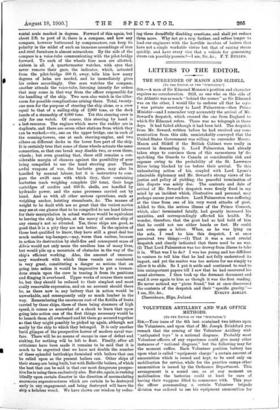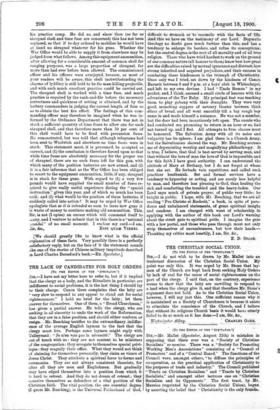VOLUNTEER ARTILLERY AND WAR OFFICE METHODS.
(TO THE EDITOR OF THE "SPECTATOR."]
SIB,—Your issue of the 4th inst. contained two letters upon the Volunteers, and upon that of Mr. Joseph Brinkford you remark that the arming of the Volunteer Artillery with " antiquated toys " is a national disgrace. Probably most Volunteer officers of any experience could give many other instances of " national disgrace," but the following may for the moment suffice. Each Volunteer position battery has upon what is called " equipment charge " a certain amount of ammunition which is issued and kept, to -be used only on mobilisation for service, while for the practice camps other ammunition is issued by the Ordnance Department. This arrangement is a sound one, as at any moment on mobilisation the batteries could at least be sure of having their waggons filled to commence with. This year the officer commanding a certain Volunteer brigade division was ordered to use his equipment ammunition for
his practice camp. He did so; and since then (so far as shrapnel shell and time fuse are concerned) this has not been replaced, so that if to-day ordered to mobilise he would have at hand no shrapnel whatever for his guns. Whether the War Office would be able to supply it from elsewhere may be judged from what follows. Among this equipment ammunition, after allowing for a considerable amount of common shell for ranging purposes, was a large proportion of shrapnel, far more than had ever before been allowed. The commissioned officer and his officers were overjoyed, because, as most of your readers will be aware, this shell (notwithstanding the charms of lyddite) is still held to be the man-killing projectile, and with such much excellent practice could be carried out. The shrapnel shell is worked with a time fuse, and much practice is required by the rank-and-file before the necessary correctness and quickness of setting is obtained, and by the battery commanders in judging the correct length of fuse so as to obtain the best fire effect. The feelings of this com- manding officer may therefore be imagined when he was in- formed by the Ordnance Department that there was not in stock a sufficient quantity of time fuses to allow one for each shrapnel shell, and that therefore more than 50 per cent. of this shell would have to be fired with percussion fuses. He remonstrated, but was told that although telegrams had been sent to Woolwich and elsewhere no time fuses were in stock. This statement must, it is presumed, be accepted as correct, and (1) the conclusion is therefore forced upon us that while time fuses are absolutely necessary for the proper use of shrapnel, there are no such fuses left for this gun, with which many of the position batteries are now armed, and (2) it is a fair inference that as the War Office has been obliged to resort to the equipment ammunition, little, if any, shrapnel is in stock for these guns. With regard to (1) a very few pounds would have supplied the small number of fuses re- quired to give really useful experience during the " special instruction " given this year, and of which so much has been said; and (2) what would be the position of these batteries if suddenly called into action ? It may be urged by War Office apologists that as it is intended so soon to issue new guns it is waste of money to continue making old ammunition. This, Sir, is not (I opine) an excuse which will commend itself to _deny, and I venture to submit that in this there is a "national .,eandal" of no small moment. I enclose my card.—I am, [We should greatly like to know what is the official explanation of these facts. Very possibly there is a perfectly satisfactory reply, but on the face of it the statement sounds eke one of the stories of Chinese military ineptitude described .n Lord Charles Beresford's book.—ED. Spectator.]



































 Previous page
Previous page